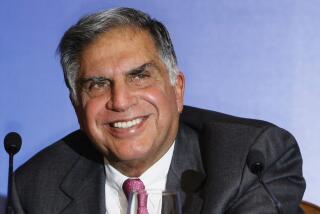Ex-Goldman director Rajat Gupta sentenced to 2 years in prison
- Share via
NEW YORK — Former Goldman Sachs director Rajat Gupta will spend two years behind bars for sharing secret company information with a hedge fund manager, becoming the highest-profile Wall Street figure heading to prison for insider trading.
Gupta once headed the prestigious consulting firm McKinsey & Co. and also served as a director to Procter & Gamble. His philanthropy around the globe has also been stunning, as Microsoft co-founder Bill Gates, former United Nations secretary general Kofi Annan and scores of others told the court in letters.
Wearing a dark suit, white shirt and blue tie, the Indian-born Gupta appeared at ease Wednesday in a courtroom filled with more than 100 relatives, reporters and other onlookers. He flashed grins ahead of the hearing to those he recognized, and kissed a daughter overcome with emotion.
Wall Street rogues: Infamous corporate villains
“I just feel terribly that I have put them through this,” said Gupta, 63. He apologized for bringing negative attention to his former employer, philanthropies and his family.
He plans to appeal the conviction, which requires him to report to prison Jan. 8 and also pay $5 million in fines. However, he did not apologize for committing the three counts of securities fraud and conspiracy a jury convicted him of in June.
The trial was among the latest in the Justice Department’s sweep of Wall Street to root out financial corruption, especially insider trading. Since August 2009, the U.S. attorney’s office in Manhattan has brought 72 insider-trading cases. Of those, 69 ended in conviction; the rest are pending.
Gupta’s involvement in the insider trading scheme shocked Wall Street because of his stature in the financial world. He was convicted of feeding lucrative non-public information to Raj Rajaratnam, the founder of hedge fund Galleon Group. Among the tips was that famed investor Warren Buffett would sink $5 billion into Goldman at the height of the financial crisis, a move that caused the investment bank’s stock to surge.
U.S. District Judge Jed Rakoff called the jury’s verdict “totally warranted” and labeled the illicit tips as “disgusting.”
He also called insider trading a “very serious crime,” one that feeds cynicism among average investors that financial markets are rigged.
“This is a country where honesty pays off,” Rakoff said.
Gupta’s attorneys sought probation. They pitched to Rakoff that Gupta serve his time helping the homeless of New York City, or work on healthcare and agriculture programs in Rwanda.
Prosecutors had wanted Gupta to spend up to a decade behind bars, sending a strong message to upper echelons of corporate America and the financial sector. It appears Gupta might have gotten off light considering Rajaratnam was sentenced to 11 years in prison last year.
Rakoff said he expected a “good man” such as Gupta who was so dedicated to philanthropy would work to redeem his reputation anyway, much like former junk bond king Michael Milken has.
The two-year sentence fell significantly below the range of six to eight years put forth in federal guidelines. Rakoff is known for his independent streak — he once declared the death penalty unconstitutional, only to be swatted down by a higher court — and he criticized federal sentencing guidelines at length in his formal ruling Wednesday.
The sentence also closed another case for Preet Bharara, the U.S. Attorney in Manhattan whose office prosecuted the case.
His probe into insider trading has garnered attention for its hard-charging tactics, including the heavy use of wiretaps that had previously been used for investigations into the mob or drug cartels. That has come under criticism from defense attorneys, who feel the government obtained them improperly.
“With today’s sentence, Rajat Gupta now must face the grave consequences of his crime — a term of imprisonment,” Preet Bharara, the U.S. Attorney in Manhattan, said in a statement. “His conduct has forever tarnished a once-sterling reputation that took years to cultivate. We hope that others who might consider breaking the securities laws will take heed from this sad occasion and choose not to follow in Mr. Gupta’s footsteps.”
More to Read
Inside the business of entertainment
The Wide Shot brings you news, analysis and insights on everything from streaming wars to production — and what it all means for the future.
You may occasionally receive promotional content from the Los Angeles Times.










